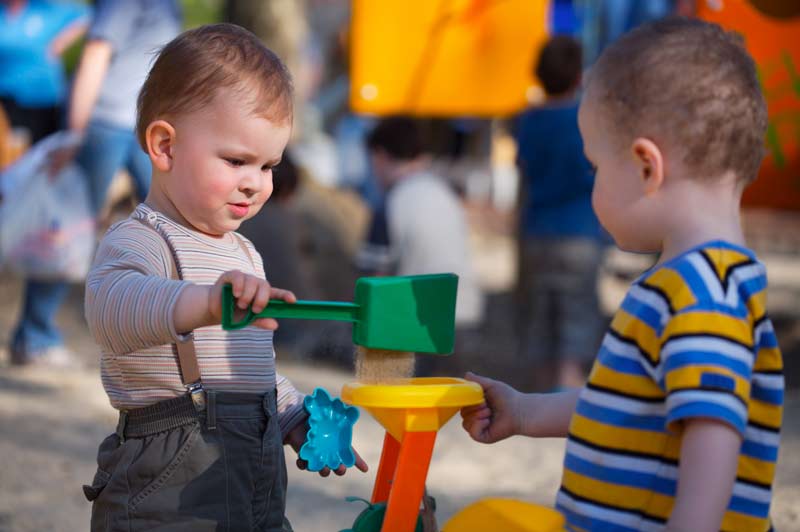Child's Play? 3-Year-Olds Fancy Their Own Ethnic Group

Get the world’s most fascinating discoveries delivered straight to your inbox.
You are now subscribed
Your newsletter sign-up was successful
Want to add more newsletters?

Delivered Daily
Daily Newsletter
Sign up for the latest discoveries, groundbreaking research and fascinating breakthroughs that impact you and the wider world direct to your inbox.

Once a week
Life's Little Mysteries
Feed your curiosity with an exclusive mystery every week, solved with science and delivered direct to your inbox before it's seen anywhere else.

Once a week
How It Works
Sign up to our free science & technology newsletter for your weekly fix of fascinating articles, quick quizzes, amazing images, and more

Delivered daily
Space.com Newsletter
Breaking space news, the latest updates on rocket launches, skywatching events and more!

Once a month
Watch This Space
Sign up to our monthly entertainment newsletter to keep up with all our coverage of the latest sci-fi and space movies, tv shows, games and books.

Once a week
Night Sky This Week
Discover this week's must-see night sky events, moon phases, and stunning astrophotos. Sign up for our skywatching newsletter and explore the universe with us!
Join the club
Get full access to premium articles, exclusive features and a growing list of member rewards.
Even in multicultural settings, preschool children may gravitate toward playing with kids of their own ethnicity, a new study finds.
But when kids do engage with playmates of another ethnicity, they show signs of adjusting their play style to match their partner's, researchers reported in June in the European Journal of Developmental Psychology.
Even very young children are influenced by the culture around them, the scientists wrote, and studies in the 1980s and 90s found that, when given the choice, children of the same ethnicity preferred to play with one another rather than with kids from different ethnic groups. Unless a child has the rare genetic disorder Williams syndrome, these preferences emerge by age 3 or so. The new study of French-Canadian and Asian-Canadian 3- to 5-year-olds finds similar results.
Child's play
All of the children went to daycare programs in suburban Montreal. In the course of two separate visits, researchers took videos of play sessions between pairs of children of the same age and gender. In some cases, both children were the same ethnicity, and in others, an Asian-Canadian and a French-Canadian child played together. A total of 60 children, 30 from each ethnicity, participated in the study. Each pair had known each other (from attending the same daycare) for at least three months.
The researchers gave the kids a few minutes of free play with toys of their choice before introducing a cooperative toy in which kids could roll marbles down colorful, twisting tracks. Finally, each kid was given a small play-house, one from Fischer Price and another with a Sesame Street theme that they could share with the other child or play with alone. Throughout the session, the researchers monitored how long the children interacted with one another and what sort of interactions they had.
As it turned out, the kids interacted with one another for longer stints when in the same-ethnicity pairs than when playing with a child of another ethnicity. Same-ethnicity partners spent about 58 percent of their time playing together during their session, compared with 44 percent in mixed-ethnicity pairs.
Get the world’s most fascinating discoveries delivered straight to your inbox.
In those single-ethnic pairs, French-Canadian children spoke to one another about four times more than Asian-Canadian children spoke to one another, possibly reflecting a cultural difference between the two groups, the researchers wrote.
Absorbing culture
"Consistent with some past research, self-expression and social initiation are highly valued in Canadian culture, [while] self-restraint and cooperation may be more important in Chinese and Asian-Canadian culture and this has an impact on multicultural peer interactions," study researcher Dale Stack, a psychologist at Concordia University in Montreal, said in a statement.
When playing with one another, however, the Asian-Canadian and French-Canadian kids adjusted their speech patterns, with the ethnically Asian children speaking more and the ethnically Caucasian children speaking less.
The findings aren't the first to demonstrate how deeply children absorb cultural mores. Earlier studies have found that by age 4, children develop anti-fat attitudes. Mirroring the rise in cursing among adults, kids now also begin to parrot swear words by age 3.
You can follow LiveScience senior writer Stephanie Pappas on Twitter @sipappas. Follow LiveScience for the latest in science news and discoveries on Twitter @livescience and on Facebook.

Stephanie Pappas is a contributing writer for Live Science, covering topics ranging from geoscience to archaeology to the human brain and behavior. She was previously a senior writer for Live Science but is now a freelancer based in Denver, Colorado, and regularly contributes to Scientific American and The Monitor, the monthly magazine of the American Psychological Association. Stephanie received a bachelor's degree in psychology from the University of South Carolina and a graduate certificate in science communication from the University of California, Santa Cruz.
 Live Science Plus
Live Science Plus










